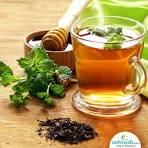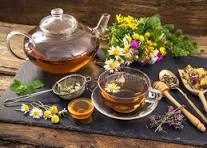Herbal Tea
Known differently as herbal infusion or tisane, it is a steeped beverage formed by herbs and spices or various plant materials inside hot water, rather than any of the camellia-based tea. Herb teas can actually be made using any ingredient as long as that ingredient is chamomile, peppermint, ginger, hibiscus, echinacea, rooibos, and so forth. A wide variety of health benefits come from these tea infusions according to the ingredients selected.

Herbal teas provide an array of health benefits, which vary depending on the herbs used. Some of the most recognized are as follows:
- Digestive Health
Peppermint tea helps ease indigestion and bloating.
Ginger tea helps with nausea and promotes digestion.
- Relaxation and Sleep Aid
Chamomile tea is said to be calming, thus helping sleep quality.
Lavender tea helps alleviate anxiety and brings about relaxation.
- Anti-inflammatory Properties
Turmeric tea is usually prepared from curcumin, which can be used as an anti-inflammatory agent to help in pain and swelling.
- Immune System Support
Echinacea tea has been used to enhance immune function. It shortens the course of a common cold.
Elderberry uses has ranged from combating viruses to supporting the immune response.
- Antioxidants
Hibiscus tea contains antioxidants that can mitigate oxidative stress and reduce blood pressure.
- Weight Control
Rooibos tea may assist in weight loss by reducing fat storage and enhancing metabolism.
- Hydration
Herbal teas are generally caffeine-free and can contribute to overall hydration.
- Menstrual Relief
Ginger and peppermint teas can help with menstrual cramps for some people.
Conclusion
Many herbal teas contain great health benefits; however, you always need to ask a doctor about it, especially if you are under any treatment or are pregnant
Preparing herbal tea is pretty easy! Here’s a basic guide to help you make a delicious cup:

Herbs or tea blend: Dried or fresh herbs (e.g., chamomile, peppermint, ginger, etc.)
Water
Equipment
Kettle or pot
Teapot or a cup with a tea infuser (optional)
Strainer (if using loose herbs)
Steps to Prepare Herbal Tea
Measure Ingredients:
Use about 1–2 teaspoons of dried herbs or 1–2 tablespoons of fresh herbs per cup of water.
Boil Water:
Heat water to a gentle boil; most herbal teas are steeped at about 190°F (88°C).
Steep the Herbs:
Place the herbs in your teapot or infuser, then pour the hot water over them. Cover and let steep for about 5–10 minutes, depending on how strong you like your tea. Strain & Serve:
If you used loose herbs, strain the tea into a cup. If you used a teabag or infuser, simply remove it.
Optional: Honey, sugar to taste or a squeeze of lemon
Enjoy

Drink and savor the aromas and flavors
Herb Combinations Tips
Try out various herb blends for varying flavors and benefits.
Dried herbs: Keep in cool, dark environments for longest freshness.
There are numerous popular herbal tea varieties, which differ in their specific flavor and potential health benefits. Here are some of the most popular ones:
- Chamomile
Flavor: Tenderly floral with a slight sweetness
Benefits: Calms the nervous system, helps sleep, and is helpful in relieving digestive issues
- Peppermint
Flavor: Refreshing, minty
Benefits: Relieves digestive issues, gets rid of headaches, and might help in relieving issues due to the sinuses.
- Ginger
Flavor: Spicy, warm
Benefits: Good for digestion, might reduce nausea, and has anti-inflammatory properties
- Hibiscus
Flavor: Sour, fruity
Benefits: Rich in antioxidants, can reduce blood pressure, and improves heart health.
- Rooibos
Flavor: Robust, sweetish
Benefits: Caffeine-free, rich in antioxidants, and supports heart health.
- Echinacea
Flavor: Earthy, slightly bitter
Benefits: It is widely used to strengthen the immune system and to ward off colds.
- Lemon Balm
Flavor: Mildly lemony, herbal
Benefits: It is calming, used to treat anxiety and sleep disorders.
- Lavender
Flavor: Floral, sweet
Benefits: Has a calming effect, may improve sleep quality and reduce stress.
- Dandelion
Flavor: Earthy, slightly bitter
Benefits: It supports liver and digestive health, has diuretic properties.
- Nettle
Flavor: Herbaceous, grassy
Benefits: High in vitamins and minerals; can be used in aiding allergy relief and general inflammation.
Conclusion
These herbal teas can be enjoyed on their own or blended together for unique combinations. Each variety brings its own flavors and health benefits, making them popular choices for relaxation and wellness.